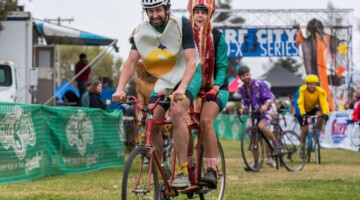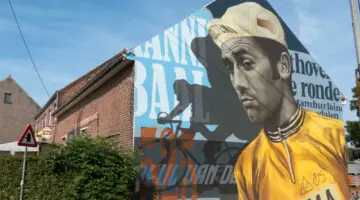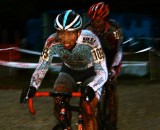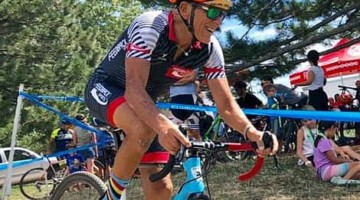Michael van den Ham is an under-23 Elite rider on the Cycle-Smart Elite team. Michael raced for Canada to 31st place at the World Championships in Louisville, Kentucky, and will be racing the New England cyclocross season in hopes of bettering his result in the upcoming Hoogerheide World Championships. Here, and in coming weeks, he’ll be filling us in on what life is like as an Elite cyclocross-specific racer.
I admit it, Charm City and Gloucester, my first big weekends of the season were, for all intents and purposes, a little rough. I crashed, rode poor lines, felt empty, hollow, and not at all like the bike racer I think I am. While I never had huge aspirations for either of these races, it was quite a shock to be cracking halfway through and barely dragging myself across the line for three of the four days.
After a couple weekends like that my instinctive reaction, and I have a feeling that I’m not alone in this, is to stumble into a cycle of derogatory questioning: Why am I doing this? Did I train well enough? Am I even cut out for this whole racing thing?
This is not, obviously, a particular helpful response. Bike racing requires me to be on top of my game; it requires me to be able to drum up the motivation to go out an train on the days that look better spent on the warm side of the window; the motivation to turn down that deliciously delightful and delectable marshmallow fluff and peanut butter covered Oreo.
Sure, after a bad weekend, it might become necessary to step back from racing’s emotional drain and drama for a moment or two, but that is the key, it can only be for a moment or two. It becomes so easy to let an hour or two of apathetic self pity slip into a day, slip into a week, and finally, jeopardize the hard work and the sacrifice that you’ve put in the months prior. Not only is rolling around in pathetic self-loathing detrimental to any attempts at training, but, as we have all just been reminded with the tragic passing of Amy Dombroski, it is a disrespect to our fragile existence. It sounds very cliche, but Amy’s sudden passing reminds us how important it is that we make the best of each opportunity, each day, we are presented with.
Yeah, yeah, that just sounds like the last five minutes of every romantic-comedy you have ever watched, right? Yet, despite hearing this type of thing constantly, it still seems that there is a vast chasm between being able to spout out this motivational mumble-jumble and actually being able to come to terms with the last weekend’s lackluster performance.
As such, while I’ve always told myself to remain positive, that by no means limited my tendency to a melodramatic diva-out when things went a little worse than planned. It was a tendency that wasn’t working, was making me slower rather than faster.
Here I was moaning about my own bad weekend to no constructive end. I realized I needed to develop strategy; a strategy that eventually became what I like to call careful post-race positive analysis. Instead of focusing on the parts of the race that didn’t go well, I’ve found it much more helpful to acknowledge where I made mistakes during the race, but dwell on my successes. This means instead of getting upset that I blew up halfway through Day 2 of Gloucester and fell backwards all race, I truthfully tell myself that I had the start I was aiming for, advise myself that my pre-race prep was as good as it’s ever been, and think back to that series of corners where I was able to gap my group. This optimism forces me to remind the inconsolable post-race self that, no, this race did not measure up to the potential it had, but there were plenty of good things to take from it and, at least in some way, there was marked improvement from the weekend prior.
We all know that cycling is full of highs and lows, but being able to manage those highs and lows can be the different between a good ’crosser and one who never managed to live up to their potential. As Adam Myerson shared with me, one of the keys to becoming a successful cyclist is to make the highs lower, and lows higher; to exhibit a consistently positive mental approach to both training and everyday life regardless of the results in any particular race. What I have described above, my measured optimistic critique, is simply my method of trying to do so. No, this doesn’t mean I’ve figured it out, no it doesn’t mean that I am emotionally unaffected by difficult races, it simply means that I’m better at managing both disappointment and success than I once was. Either way, here’s hoping the rest of the season brings more along the lines of managing emotional highs than emotional lows!


























